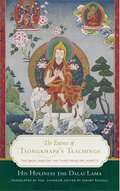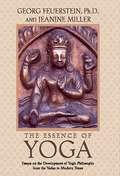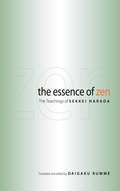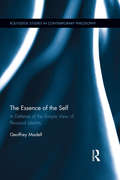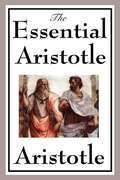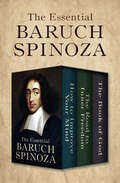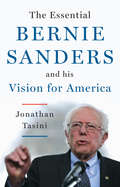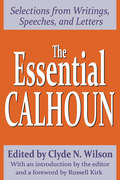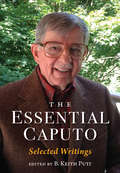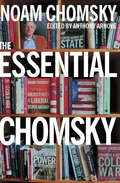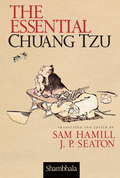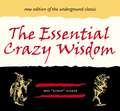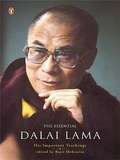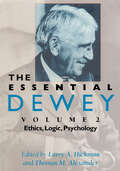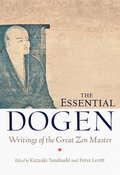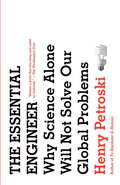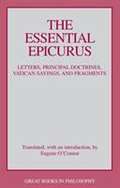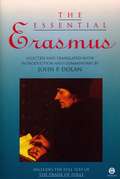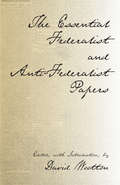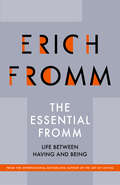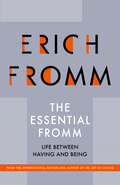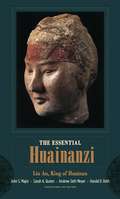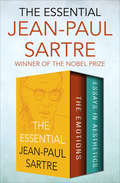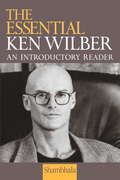- Table View
- List View
The Essence of Tsongkhapa's Teachings: The Dalai Lama on the Three Principal Aspects of the Path
by Dalai LamaLearn from the Dalai Lama the three steps to awakening: 1) renunciation, 2) the awakening mind, and 3) emptiness.His Holiness the Dalai Lama’s commentary on Tsongkhapa’s Three Principal Aspects of the Path helps us integrate the full Buddhist path into our own practice. His Holiness offers a beautiful elucidation of the three aspects of the path: true renunciation based on the wish for freedom, the altruistic awakening mind ( bodhichitta ), and the correct view of emptiness. These three aspects of the path are the axis of all the practices of both sutra and tantra, and they encapsulate Tsongkhapa’s vision of the Buddhist path in its entirety. In their absence, it is impossible for us to develop the great compassion that aspires to liberate other sentient beings from samsara and we will not be able to go beyond this cycle of existence. Practitioners will find The Three Principal Aspects of the Path invaluable as a manual for daily meditation. The universal and timeless insights of this text speak to contemporary spiritual aspirants, East and West. The root verses are presented in both Tibetan and English translation to accompany these profound teachings.
The Essence of Yoga: Essays on the Development of Yogic Philosophy from the Vedas to Modern Times
by Georg Feuerstein Jeanine MillerA collection of classic essays by two highly regarded scholars on the development of yoga and its rapport with other religious traditions. Georg Feuerstein, one of the world's foremost scholars of yoga, and Jeanine Miller, long recognized for her insightful commentaries on the RgVeda, here pool their considerable talents in a look at the development of yogic thought across the ages and its similarities with the Christian mysticism of Meister Eckhart. Two of their essays included here, one concerning the essence of yoga and the other looking at the meaning of suffering in yoga, have long been singled out by indologists for correcting prevalent misconceptions and providing a conceptual framework for many of the subsequent studies in that field. The reprinting of these important essays in The Essence of Yoga gives new readers a chance to share some of the authors' earliest insights into yoga and their deep conviction that these discoveries are of the highest significance for a proper understanding of the human condition.
The Essence of Zen
by Daigaku Rumme Sekkei HaradaThe Essence of Zen is an expert's guided tour of the ins and outs of the tradition's approach to meditation, enlightenment, and the oneness of all things. To read it is to enter into one of modern Japanese Zen's most subtle and sophisticated minds. Sekkei Harada skillfully pushes us to drop those parts of ourselves that grasp and make demands regarding our understanding or progress in meditation practice. He enables us to see clearly-and steer clear of-the philosophical stumbling blocks that can make the path precarious. The Essence of Zen represents the most succinct of his teachings, making it of immediate value to anyone with an interest in Zen. The book also contains Harada's explanations of the differences between the tradition's primary schools, making it particularly helpful to newcomers.
The Essence of the Self: In Defense of the Simple View of Personal Identity (Routledge Studies in Contemporary Philosophy)
by Geoffrey MadellIn this volume, Geoffrey Madell develops a revised account of the self, making a compelling case for why the "simple" or "anti-criterial" view of personal identity warrants a robust defense. Madell critiques recent discussions of the self for focusing on features which are common to all selves, and which therefore fail to capture the uniqueness of each self. In establishing his own view of personal identity, Madell proposes (a) that there is always a gap between ‘A is f and g’ and ‘I am f and g’; (b), that a complete description of the world offered without recourse to indexicals will fail to account for the contingent truth that I am one of the persons described; and (c), that an account of conscious perspectives on the world must take into account what it means for an apparently arbitrary one of these perspectives to be mine. Engaging with contemporary positions on the first person, embodiment, psychological continuity, and other ongoing arguments, Madell contends that there can be no such thing as a criterion of personal identity through time, that no bodily or psychological continuity approach to the issue can succeed, and that personal identity through time must be absolute, not a matter of degree. Madell’s view that the nature of the self is substantively different from that of objects in the world will generate significant discussion and debate among philosophers of mind.
The Essential Aristotle
by AristotleAristotle was a Greek philosopher and a student of Plato. He taught Alexander the Great, and wrote on many subjects, including physics, metaphysics, poetry, theater, music, logic, rhetoric, politics, government, ethics, biology, and zoology. Together with Plato and Socrates, Aristotle is one of the most important founding figures in Western philosophy. He was the first to create a comprehensive system of Western philosophy, encompassing morality and aesthetics, logic and science, politics and metaphysics. Aristotle's views on the physical sciences profoundly shaped medieval scholarship, and their influence extended well into the Renaissance.
The Essential Baruch Spinoza: How to Improve Your Mind, The Road to Inner Freedom, and The Book of God
by Baruch SpinozaThree philosophical works by the seventeenth-century Enlightenment thinker and author of Ethics.How to Improve Your MindIn this earlier work, Dutch philosopher Baruch Spinoza articulates his view that life is best lived with the supreme happiness of knowing God&’s infinite love. By extension, all earthly pursuits—including money, fame, and sex—are mere distractions from the greater joy of the soul&’s quietude.Translated by the philosopher and founder of the Philosophical Library, Dagobert D. Runes. Runes also provides exclusive commentary and biographical notes.The Road to Inner FreedomSpinoza views the ability to experience rational love of God as the key to mastering the contradictory and violent human emotions.The Book of GodThe Book of God, one of Spinzoa&’s earliest works, came to light only a hundred years ago in two slightly varying Dutch manuscripts. Its youthful author lived in turbulent times, when the Western world was torn by civil and religious strife, and bullies, bigots and pseudo-prophets vied for the ear of a fearful people. While Europe was in an uproar over the right church, Spinoza was seeking the right God. This book is the first known report of his findings. Translated by Dr. A. Wolf from the Dutch [the author&’s Tractatus de Deo et homine version] and edited and with an introduction by Dagobert D. Runes.
The Essential Bernie Sanders and His Vision for America
by Jonathan TasiniMeet the essential Bernie Sanders--an authentic and uncompromising champion of the people. Independent United States Senator Bernie Sanders--with a thirty-five-year career in public service, first as Burlington, Vermont's mayor, then as Vermont's sole representative to Congress, and currently as a United States senator--is now campaigning to become president of the United States. His goal is to build a movement to take back our country from the rich and powerful, and return it to its rightful owners--we, the American people. Sanders' common sense, populist message is resonating with Democrats, Republicans, independents, as well as ordinary working- and middle-class Americans from all walks of life, including millennials, seniors, veterans, immigrants, environmentalists, union workers, and more. In this short, accessible book, author Jonathan Tasini draws heavily from Sanders' ample public record of speeches, statements, and interviews, and couples his working-class spirit with specific legislation he has championed on a number of core proposals that comprise a broader people's agenda for America, including: A national, single-payer health care system; Free public higher education; Taking on wealth and income inequality; Preserving Social Security; Caring for our veterans; Ensuring civil rights for all; Combatting climate change; Reforming Wall Street, and much more. The Essential Bernie Sanders and His Vision for America is a must-read for anyone who shares a vision for a forward-looking, sustainable, and more just United States of America, and is eager to change the course of history.
The Essential Calhoun (The Library of Conservative Thought)
by Clyde N. WilsonJohn C. Calhoun was a major actor in the political history of nineteenth-century America. His dramatic career will always be of interest. However, Calhoun is equally important as a political thinker who continues to elicit widespread interest from the most diverse points of the ideological spectrum. The Essential Calhoun presents a full-fledged selection of speeches and writings taken from the entire forty-year span of Calhoun's public career and from many varieties of occasions, public and private. For the first time, it is possible to appreciate Calhoun fully and to consider his thought within the compass of a single volume.Calhoun is known to posterity as the premier defender of the Old South and slavery and as the theorist of the concurrent majority. His contemporaries knew him as much else, including a political economist and foreign policy authority. As the range of writings shows, he was a valuable and often prophetic commentator.Calhoun's thought testifies to a deep and abiding concern with moral and ethical issues that confront a government resting on the consent of the people. The fundamental question with which he wrestles in all his works is how to achieve and maintain a proper balance between power and liberty in a democratic society. By providing the most representative compendium of his thought, The Essential Calhoun invites the reader to engage in this exercise of applying the moral imagination realistically to the public business of America. Historians, American studies specialists, economists, and political scientists will find this volume indispensible.
The Essential Caputo: Selected Writings
by B. Keith PuttThis landmark collection features selected writings by John D. Caputo, one of the most creative and influential thinkers working in the philosophy of religion today. B Keith Putt presents 21 of Caputo’s most significant contributions from his distinguished 40-year career. Putt’s thoughtful editing and arrangement highlights how Caputo's multidimensional thought has evolved from radical hermeneutics to radical theology. A guiding introduction situates Caputo's corpus within the context of debates in the Continental philosophy of religion and exclusive interview with him adds valuable information about his own views of his work.
The Essential Chomsky: Essays On Freedom And Democracy (New Press Essential Ser.)
by Noam ChomskyThe seminal writings of America&’s leading philosopher, linguist, and political thinker—&“the foremost gadfly of our national conscience&” (The New York Times). For the past fifty years Noam Chomsky&’s writings on politics and language have established him as a preeminent public intellectual as well as one of the most original political and social critics of our time. Among the seminal figures in linguistic theory over the past century, Chomsky has also secured a place among the most influential dissident voice in the United States. Chomsky&’s many bestselling works—including Manufacturing Consent, Hegemony or Survival, Understanding Power, and Failed States—have served as essential touchstones for activists, scholars, and concerned citizens on subjects ranging from the media and intellectual freedom to human rights and war crimes. In particular, Chomsky&’s scathing critique of the US wars in Vietnam, Central America, and the Middle East have furnished a widely accepted intellectual premise for antiwar movements for nearly four decades. The Essential Chomsky assembles the core of his most important writings, including excerpts from his most influential texts over the past half century. Here is an unprecedented, comprehensive overview of the thought that animates &“one of the West&’s most influential intellectuals in the cause of peace&” (The Independent). &“Chomsky ranks with Marx, Shakespeare, and the Bible as one of the ten most quoted sources in the humanities—and is the only writer among them still alive.&” —The Guardian &“Noam Chomsky is one of the most significant challengers of unjust power and delusions; he goes against every assumption about American altruism and humanitarianism.&” —Edward Said &“A rebel without a pause.&” —Bono
The Essential Chuang Tzu
by Sam HamillThe Chuang Tzu has been translated into English numerous times, but never with the freshness, accessibility, and accuracy of this remarkable rendering. Here the immediacy of Chuang Tzu's language is restored in a idiom that is both completely fresh and true to the original text. This unique collaboration between one of America's premier poet-translators and a leading Chinese scholar presents the so-called "Inner Chapters" of the text, along with important selections from other chapters thought to have been written by Chuang Tzu's disciples.
The Essential Crazy Wisdom
by Wes NiskerTake a wild and rickety ride through the philosophies of the East and West to discover the madmen, dreamers, and unconventional wisdom seekers in the abridged, better-than-ever version of our best-selling cult classic. THE ESSENTIAL CRAZY WISDOM delivers the most significant, most lunatic, and most compelling insights of the ages. Scoop Nisker patches together the unorthodox teachings that have bubbled up through the words of such crazy visionaries as Rumi, Gautama the Buddha, Mark Twain, Lao Tzu, Albert Einstein, Mahatma Gandhi, Allen Ginsberg, and Lily Tomlin. Discover the common thread in these multiple perspectives and travel on this comedic course to enlightenment! Ģ Original edition sold over 40,000 copies.
The Essential Dalai Lama
by Rajiv MehrotraAn invaluable collection that brings together the best of the Dalai Lama's writings on all aspects of life An inspiration to millions of people worldwide, the Dalai Lama has authored more than fifty books. Now, for the first time, The Essential Dalai Lama brings together the best of the Dalai Lama's writings on all aspects of life, from work to meditation. Divided into four sections-The Vision, Buddhist Perspectives, Practice, A World in Harmony-The Essential Dalai Lama contains eloquent applications of the principles of ancient Buddhist thought to contemporary issues, all expressed in the Dalai Lama's uniquely compelling voice. This is the perfect compilation for anyone who wishes to have one source for the Dalai Lama's teachings or who seeks an introduction to the philosophy and practice of Buddhism.
The Essential Dewey: Ethics, Logic, Psychology (The Essential Dewey #2)
by Larry A. Hickman and Thomas M. AlexanderThe second half of the insightful anthology of essays and book chapters from the American technical philosopher.In addition to being one of the greatest technical philosophers of the twentieth century, John Dewey (1859–1952) was an educational innovator, a Progressive Era reformer, and one of America’s last great public intellectuals. Dewey’s insights into the problems of public education, immigration, the prospects for democratic government, and the relation of religious faith to science are as fresh today as when they were first published. His penetrating treatments of the nature and function of philosophy, the ethical and aesthetic dimensions of life, and the role of inquiry in human experience are of increasing relevance at the turn of the twenty-first century.Based on the award-winning thirty-seven-volume critical edition of Dewey’s work, The Essential Dewey presents for the first time a collection of Dewey’s writings that is both manageable and comprehensive. The volume includes essays and book chapters that exhibit Dewey’s intellectual development over time; the selection represents his mature thinking on every major issue to which he turned his attention. Eleven part divisions cover: Dewey in Context; Reconstructing Philosophy; Evolutionary Naturalism; Pragmatic Metaphysics; Habit, Conduct, and Language; Meaning, Truth, and Inquiry; Valuation and Ethics; The Aims of Education; The Individual, the Community, and Democracy; Pragmatism and Culture: Science and Technology, Art and Religion; and Interpretations and Critiques. Taken as a whole, this collection provides unique access to Dewey’s understanding of the problems and prospects of human existence and of the philosophical enterprise.“In the course of his long life, Dewey wrote and published on myriad topics: certainly, and perhaps most importantly to him, on public education, but also—and extensively—on technical philosophy, including metaphysics, epistemology, logic, aesthetics, religion, science, ethics, and social philosophy. And though neglected by academic philosophers for a time, Dewey’s pragmatic orientation has recently proved influential in the thought of Quine, Putnam, and Rorty, among others. This two-volume collection of essays and book chapters, culled from an earlier 37-volume critical edition of his works, provides for the first time a publication of his writings that is both manageable and comprehensive.” —Library Journal
The Essential Dogen: Writings of the Great Zen Master
by Peter Levitt Kazuaki TanahashiEihei Dogen (1200-1253), founder of the Soto School of Zen Buddhism, is one of the greatest religious, philosophical, and literary geniuses of Japan. His writings have been studied by Zen students for centuries, particularly his masterwork, Shobo Genzo or Treasury of the True Dharma Eye. This is the first book to offer the great master's incisive wisdom in short selections taken from the whole range of his voluminous works. The pithy and powerful readings, arranged according to theme, provide a perfect introduction to Dogen--and inspire spiritual practice in people of all traditions.
The Essential Engineer: Why Science Alone Will Not Solve Our Global Problems
by Henry PetroskiFrom the acclaimed author of The Pencil and To Engineer Is Human, The Essential Engineer is an eye-opening exploration of the ways in which science and engineering must work together to address our world&’s most pressing issues, from dealing with climate change and the prevention of natural disasters to the development of efficient automobiles and the search for renewable energy sources. While the scientist may identify problems, it falls to the engineer to solve them. It is the inherent practicality of engineering, which takes into account structural, economic, environmental, and other factors that science often does not consider, that makes engineering vital to answering our most urgent concerns.Henry Petroski takes us inside the research, development, and debates surrounding the most critical challenges of our time, exploring the feasibility of biofuels, the progress of battery-operated cars, and the question of nuclear power. He gives us an in-depth investigation of the various options for renewable energy—among them solar, wind, tidal, and ethanol—explaining the benefits and risks of each. Will windmills soon populate our landscape the way they did in previous centuries? Will synthetic trees, said to be more efficient at absorbing harmful carbon dioxide than real trees, soon dot our prairies? Will we construct a &“sunshade&” in outer space to protect ourselves from dangerous rays? In many cases, the technology already exists. What&’s needed is not so much invention as engineering.Just as the great achievements of centuries past—the steamship, the airplane, the moon landing—once seemed beyond reach, the solutions to the twenty-first century&’s problems await only a similar coordination of science and engineering. Eloquently reasoned and written, The Essential Engineer identifies and illuminates these problems—and, above all, sets out a course for putting ideas into action.
The Essential Epicurus: Letters, Principal Doctrines, Vatican Sayings, and Fragments (Great Books In Philosophy)
by Eugene O'ConnorEpicureanism is commonly regarded as the refined satisfaction of physical desires. As a philosophy, however, it also denoted the striving after an independent state of mind and body, imperturbability, and reliance on sensory data as the true basis of knowledge. Epicurus (ca. 341-271 B.C.) founded one of the most famous and influential philosophical schools of antiquity. In these remains of his vast output of scientific and ethical writings, we can trace Epicurus' views on atomism, physical sensation, duty, morality, the soul, and the nature of the gods.
The Essential Erasmus (Essentials Ser.)
by John Dolan Desiderius ErasmusIn his own day a center of controversy, in the four hundred years since his death known too often solely as an apostle of mockery and irreverence, Erasmus can be seen today in a new light—as a humanist whose concen is at once contemporary and Christian. <P><P>The Essential Erasmus is the first single volume in English to show the full spectrum of this Renaissance man's thought, which is no less profound because it is expressed with the grace, wit, and ironic detachment only a great writer can achieve.
The Essential Federalist and Anti-Federalist Papers
by Alexander Hamilton James Madison John Jay David WoottonHere, in a single volume, is a selection of the classic critiques of the new Constitution penned by such ardent defenders of states' rights and personal liberty as George Mason, Patrick Henry, and Melancton Smith; pro-Constitution writings by James Wilson and Noah Webster; and thirty-three of the best-known and most crucial Federalist Papers by Alexander Hamilton, James Madison, and John Jay. The texts of the chief constitutional documents of the early Republic are included as well.David Wootton's illuminating Introduction examines the history of such American principles of government as checks and balances, the separation of powers, representation by election, and judicial independence--including their roots in the largely Scottish, English, and French new science of politics. It also offers suggestions for reading The Federalist, the classic elaboration of these principles written in defense of a new Constitution that sought to apply them to the young Republic.
The Essential Fromm
by Erich Fromm Rainer FunkAs Fromm points out, ours is "a life between having and being"--between mere having and healthy being, between destructiveness and creativity, between narcissism and productive self-understanding, between passivity and the joy of positive activity. The alternatives of having and being are basic orientations of our character and determine our behavior. The mostly unpublished and unknown texts featured in The Essential Fromm encapsulate Fromm's views on the fulfilling life. To put down roots yet remain free is what the late Erich Fromm called the art of being. It is the secret of happiness.
The Essential Fromm: Life Between Having and Being
by Erich FrommEssays on human alienation, mode of existence, consumerism, narcissism, and more from &“both a psychologist of penetration and a writer of ability&” (Chicago Tribune). As Erich Fromm points out, ours is &“a life between having and being&”—between mere having and healthy being, between destructiveness and creativity, between narcissism and productive self-understanding, between passivity and the joy of positive activity. The alternatives of having and being are basic orientations of our character and determine our behavior. The mostly unpublished and unknown texts featured in The Essential Fromm encapsulate the psychologist&’s views on the fulfilling life. To put down roots yet remain free is what the late Erich Fromm called the art of being. It is the secret of happiness.
The Essential Huainanzi (Translations from the Asian Classics)
by An Li, King of HuainanCompiled in the second century B.C.E, the Huainanzi clarifies a crucial period in the development of Chinese conceptions of the cosmos, human nature, and the social order. Outlining "all that a modern monarch needs to know," the text emphasizes rigorous self-cultivation and mental discipline, attributing successful rule to a balance of broad knowledge, diligent application, and penetrating wisdom.In 2010, the editors of this volume completed the first complete English-language translation of the Huainanzi, opening exciting new pathways in the study of philosophy, Asian studies, political science, and Asian literature. This abridgement contains essential selections from each of the Huainanzi's twenty-one chapters and adds a new introduction and chapter descriptions. The text represents a remarkable synthesis of Daoist classics, such as the Laozi and the Zhuangzi; works associated with the Confucian tradition, such as the Changes, the Odes, and the Documents; and a range of other foundational philosophical and literary works, from the Mozi to the Hanfeizi. The abridgement preserves the Huainanzi's special rhetorical features, such as its parallel prose, verse, and unique compositional techniques. For decades, Western scholars overlooked the Huainanzi's sophisticated structure, creative content, and rich historical value, yet all that changed with the translation of the full text. Designed for classroom use and general readers, The Essential Huainanzi continues to increase awareness of this brilliant work and change our understanding of early Chinese history.
The Essential Huainanzi: Liu An, King of Huainan
by Major Meyer Roth John S. Queen Sarah A. Andrew Seth Harold D.Columbia University Press’s widely anticipated, complete translation of the Huainanzi, published in 2010, opened exciting new pathways in the study of classical Chinese philosophy and literature. Compiled in the second century B.C.E., the Huainanzi is a critical work of early Chinese thought, clarifying a crucial period in the development of Chinese conceptions of the cosmos, human nature, and the social order. This abridgement contains essential selections from each of the Huainanzi’s twenty-one chapters and adds a new introduction and chapter descriptions. Designed for classroom use and general readers, it allows even greater access to this central work of Chinese intellectual history. Outlining “all that a modern monarch needs to know” in order to govern efficaciously, the Huainanzi emphasizes rigorous self-cultivation and mental discipline, attributing successful rule to a balance of broad knowledge, diligent application, and penetrating wisdom. The text represents a remarkable synthesis of Daoist classics, such as the Laozi and the Zhuangzi; works associated with the Confucian tradition, such as the Changes, the Odes, and the Documents; and a range of other foundational philosophical and literary texts, from the Mozi to the Hanfeizi. This abridgement preserves the Huainanzi’s special rhetorical features, such as its parallel prose and verse, and its unique compositional techniques, making its form and content accessible to students, specialists of later China, and audiences new to Chinese history and thought. For decades, Western scholars overlooked the Huainanzi’s sophisticated structure, creative content, and rich historical value, yet all that changed with the translation of the full text. The Essential Huainanzi continues to increase awareness of this brilliant work and change our understanding of early Chinese history.
The Essential Jean-Paul Sartre: The Emotions and Essays in Aesthetics
by Jean-Paul SartreThe renowned French philosopher lays the foundation for an Existentialist approach to psychology and aesthetics in this pair of classic works. In The Emotions: Outline of a Theory, Jean-Paul Sartre explores the role of emotions in the human psyche, presenting a phenomenological approach to psychology. Analyzing the universal, yet subjective, experiences of fear, lust, anguish, and melancholy, Sartre asserts that human beings develop their emotional capabilities from a very early age, which helps them identify and understand the names and qualities of their feelings later in life. Essays in Aesthetics is a provocative collection that explores the nature of art and its meaning. Sartre considers the artist&’s &“function,&” and the relation between art and the human condition. Engaging with the works of Tintoretto, Calder, Lapoujade, Titian, Raphael, and Michaelangelo, Sartre offers a fascinating analysis of the creative process. The result is a vibrant manifesto of existentialist aesthetics.
The Essential Ken Wilber
by Ken WilberEver since the publication of his first book, The Spectrum of Consciousness, written when he was twenty-three, Ken Wilber has been identified as the most comprehensive philosophical thinker of our times. This introductory sampler, designed to acquaint newcomers with his work, contains brief passages from his most popular books, ranging over a variety of topics, including levels of consciousness, mystical experience, meditation practice, death, the perennial philosophy, and Wilber's integral approach to reality, integrating matter, body, mind, soul, and spirit. Here is Wilber's writing at its most reader-friendly, discussing essential ideas of the world's great psychological, philosophical, and spiritual traditions in language that is lucid, engaging, and inspirational.
